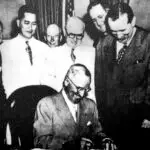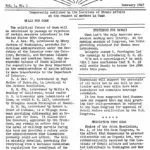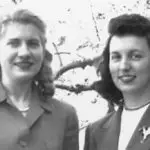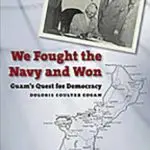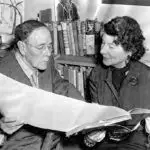Institute of Ethnic Affairs
Table of Contents
Share This
Had a role in Guam's quest for democracy
Husband and wife John Collier and Laura Thompson started the Institute of Ethnic Affairs in 1945 as a nonprofit organization whose purpose was to search for solutions to problems within and between white and colored races, cultural minority groups, and dependent peoples at home and abroad. The Institute’s goal was to recommend administrative changes requiring governmental action.
Collier had been the Commissioner of the Bureau of Indian Affairs at the Department of Interior. Thompson was an anthropologist who had been brought to Guam by the US Navy in 1938 and wrote Guam and Its People, first published in 1939.
Some of the other noteworthy social scientists were Clyde Kluckholn, PhD, director of the Research Center for Group Dynamics at the Massachusetts Institute of Technology; Harold Lasswell, PhD, a law professor at Yale University; Philleop Nash, PhD, anthropologist on the staff of the White House; and, Louis Adamic, Saul Padover, and Carey McWilliams, authors.
The Institute’s members were concerned about what they termed a social illness in America that was reemerging after World War II in the form of isolationism, anti-Semitism and US rivalry with Russia over nuclear weapons. In order to cure this illness, the group believed that people should plant the idea in their children that different races need one another. They also wanted to see the US take the lead on the colonial problems by granting its new Pacific Island dependencies self-government under United Nations trusteeship and end the 45 year military rule over Guam and American Samoa.
Collier was appointed by Interior Secretary Harold L. Ickes as an adviser to the US delegation on trusteeship matters at the first session of the United Nations General Assembly, held in London. He worked with Abe Fortes, then-assistant secretary of Interior, to draft a “Resolution of Non-Self-Governing Peoples.” Fortes later became an associate US Supreme Court justice.
The resolution was endorsed by Secretary of State John Foster Dulles, chairman of the American delegation. After much discussion by all participants, the measure was passed by all 51 countries, then members of the newly formed United Nations General Assembly.
News Letter and Guam Echo
With that success under their belt, the Institute’s next plan of action was to publish a news letter in order to better inform the public of their ideas and actions.
A short item in the first News Letter, published in February 1946, was enthusiastically received by leaders of Guam who sent in their membership applications and a combined money order with their membership fees. They expressed the:
sincere hope that this new institute will find out sufficient facts which will open the eyes and minds of those big people in the States who are holding the fate of thousands of inhabitants.
The first 44 members to the Institute from Guam were Felix M. Camacho, Jose C. Duenas, Antonio Perez, Jesus C. Santos, Edward T. Calvo, Ismael T. Calvo, Vicente Camacho, Francisco Flores, Francisco B. Leon Guerrero, William L. Lujan, Jose C. Manibusan, Juan Muna, Vicente C. Reyes, Juan Roberto, Simon A. Sanchez, Ambrosio Shimizu, Herman T. Ada, Joseph T. Ada, Rose T. Aguigui, Joaquin T. Aguon, Francisco D. Alacantara, Jesus C. Artero, Antonio C. Blaz, Pedro M. Camacho, Pedro S. Camacho, Felix T. Carbullido, Manuel T. Charfauros, Enemecio S.N. Diego, Antonio S.N. Duenas, Juan C. Flores, Juan B. Guerrero, Paciano G. Gumataotao, Cristobal Hines, Agueda I. Johnston, Segundo P. Leon Guerrero, Joaquin A. Limtiaco, E. C. Sablan, Ramon M. Sablan, Enrique S. San Nicolas, Francisco Q. Sanchez, Joaquin S. Santos, Mariano B. Santos, Joaquin T. Shimizu and Vicente C. Tydingco.
Eventually the list of Guam members grew to 500 before the Organic Act was signed in 1950.
Ickes resigned his post at the Interior Department that same month and became a widely-read syndicated newspaper columnist reaching millions of readers. Collier invited him to be the speaker at the Institute’s first annual meeting in May where he delivered what later became known as the opening salvo in the battle to take the governments of Guam and American Samoa away from the Navy and to place the former Japanese islands in the Trusteeship Council under the General Assembly of the United Nations instead of the Security Council.
A month later a young woman with a newly earned journalism degree, Dolores Coulter Cogan, was hired to report and edit the News Letter and later another publication, just for Guam called The Echo. In 2008, she published a book about their work, We Fought the Navy and Won – Guam’s Quest for Democracy.
Cogan said she and others in the office marveled at the $5 and $10 bills that came from Guam to support their work, knowing that people were paid very little money in Guam. They also marveled at the letters of support. One from Simon Sanchez, a local educator and civic leader, which was printed in the News Letter, said:
We firmly believe that the Institute is doing its utmost to promote the general welfare of the people, particularly in those places in the United States flag where American ideals and principles are not practiced extensively and where the line of demarcation or discrimination is most noticeable and hurtful to the island inhabitants.
We love the American people. We are truly loyal to them. We believe that the principles of democracy as practiced in America and backed by the Constitution of the United States is the best form of government in the world. We have inexpressible appreciation of the Americans for freeing us from the hands of the Japanese…
We are now living in a new era with many rapid changes but with great hope that the present regime will be forever benevolent, fair, just and without any discrimination as to race, color, nationality or social standing. We earnestly pray that the administrators will encourage maximum individual abilities which will undoubtedly make them more valuable and significant in their island home.
The first issue of the Guam Echo was published by the Institute in February 1947. The group believed it was important for CHamorus to hear the news about the fight for a civilian government for Guam from a source other than the Navy. At the time, the Guam Navy News (fore runner of the Guam Daily News) was the only source of news on island.
The Guam Echo focused on bills introduced, speeches made and any other action regarding these issues.
The group also worked to let the national media know about Navy rule in Guam. At one point the Navy arranged for 10 reporters to visit the island, all expenses paid, in an effort to get favorable press about its continued hold of Guam. The reporters were able to elude military surveillance and talk to CHamorus/Chamorros alone. Excerpts were printed in newspapers around the country about the situation.
A reporter from the Chicago Tribune Press Service reported that the Navy was throttling free enterprise and treating the CHamorus as inferiors. The Washington Post reported about wage discrimination:
Any “citizen” regardless of his race – Chinese, Japanese, Hawaiian, etc. – receives a wage four times that of a CHamoru with the same skill on the same type of job. A CHamoru electrician, for example, makes 43 cents an hour. An imported Civil Service electrician working on the same United States Government project, doing similar work gets $1.80 per hour. An imported electrician working for a private contractor doing Naval work on the island is paid $1.95 an hour. CHamorus are generally not allowed to work for private contractors.
A report in the Christian Science Monitor said:
It is not overstating the case to report that the form of government which exists here is autocratic and undemocratic.
Cougan reported about the newspaper articles in the News Letter and Guam Echo so that the people of Guam would know what was being said about the situation. The Navy continued to maintain that civilian rule would be best for Guam but “not now.”
The group kept up public pressure on the Navy, the president and US Congress, helping CHamorus eventually get not only a civilian government, but also US citizenship with the signing of the Organic Act on 1 August 1950.
They also provided a means for CHamorus to get news with respect to issues of relevance to Guam on a timely basis. And when leaders from Guam made their way to Washington DC, the Institute helped arrange for press coverage.
Guam Echo
For further reading
Cogan, Doloris Coulter. We Fought the Navy and Won: Guam’s Quest for Democracy. Honolulu: University of Hawai’i Press, 2008.
History Matters: The US Survey Course on the Web. “‘We Took Away Their Best Lands, Broke Treaties’: John Collier Promises to Reform Indian Policy.” Last modified 22 March 2018.
Truman State University Pickler Memorial Library. “John Collier Papers.” Last modified 6 June 2021.

